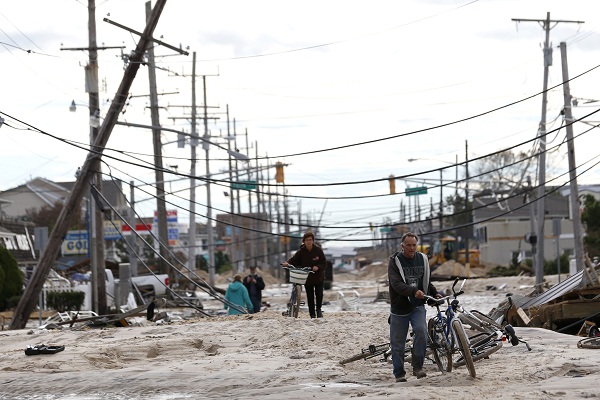US region hit by Sandy slowly resumes daily life

People walk through sand that washed up from the beach and onto Route 35 during superstorm Sandy, Wednesday in Lavallette, New Jersey. Sandy, the storm that made landfall Monday, caused multiple fatalities, halted mass transit and cut power to more than 6 million homes and businesses. AP
NEW YORK — Residents along the battered US East Coast slowly reclaimed their daily routines on Thursday, even as crews searched for victims and hundreds of thousands remained without power after superstorm Sandy claimed more than 70 lives.
New York’s three major airports were expected to be open with limited flights. Limited service on the city’s subway, which suffered the worst damage in its 108-year history, would resume. The New York Stock Exchange came back to life on Wednesday.
President Barack Obama landed in New Jersey on Wednesday, which was hardest hit by Monday’s hurricane-driven storm, and he took a helicopter tour of the devastation with Gov. Chris Christie. “We’re going to be here for the long haul,” Obama told people at one emergency shelter.
For the first time since the storm pummeled the heavily populated Northeast, doing billions of dollars in damage, brilliant sunshine washed over New York City, for a while.
At the stock exchange, running on generator power, Mayor Michael Bloomberg gave a thumbs-up and rang the opening bell to whoops from traders. Trading resumed after the first two-day weather shutdown since a blizzard in 1888.
Article continues after this advertisementIt was clear that restoring the region to its ordinarily frenetic pace could take days — and that rebuilding the hardest-hit communities and the transportation networks could take considerably longer.
Article continues after this advertisementThere were still only hints of the economic impact of the storm.
Forecasting firm IHS Global Insight predicted it would cause $20 billion in damage and $10 billion to $30 billion in lost business. Another firm, AIR Worldwide, estimated losses up to $15 billion.
About 6 million homes and businesses were still without power, mostly in New York and New Jersey. Electricity was out as far west as Wisconsin in the Midwest and as far south as the Carolinas.
In New Jersey, National Guard troops arrived in the heavily flooded city of Hoboken, just across the river from New York City, to help evacuate about 20,000 people still stuck in their homes and deliver ready-to-eat meals. Live wires dangled in floodwaters that Mayor Dawn Zimmer said were rapidly mixing with sewage.
Tempers flared. A man screamed at emergency officials in Hoboken about why food and water had not been delivered to residents just a few blocks away. The man, who would not give his name, said he blew up an air mattress to float over to a staging area.
As New York crept toward a semi-normal business day, morning rush-hour traffic was heavy as buses returned to the streets and bridges linking Manhattan to the rest of the world were open.
A huge line formed at the Empire State Building as the observation deck reopened.
Tourism returned, but the city’s vast and aging infrastructure remained a huge challenge.
Power company Consolidated Edison said it could be the weekend before power is restored to Manhattan and Brooklyn, perhaps longer for other New York boroughs and the New York suburbs.
Amtrak said the amount of water in train tunnels under the Hudson and East rivers was unprecedented, but it said it planned to restore some service on Friday to and from New York City — its busiest corridor — and would give details Thursday.
In Connecticut, some residents of Fairfield returned home in kayaks and canoes to inspect widespread damage left by retreating floodwaters that kept other homeowners at bay.
“The uncertainty is the worst,” said Jessica Levitt, who was told it could be a week before she can enter her house. “Even if we had damage, you just want to be able to do something. We can’t even get started.”
In New York, residents of the flooded beachfront neighborhood of Breezy Point returned home to find fire had taken everything the water had not. A huge blaze destroyed perhaps 100 homes in the close-knit community where many had stayed behind despite being told to evacuate.
John Frawley, who lived about five houses from the fire’s edge, said he spent the night terrified “not knowing if the fire was going to jump the boulevard and come up to my house.”
“I stayed up all night,” he said. “The screams. The fire. It was horrifying.”